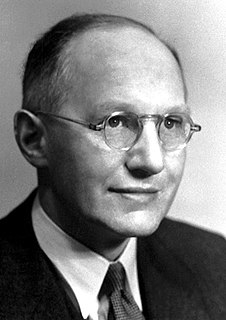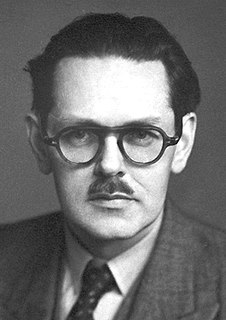Related Research Articles

Ernest Thomas Sinton Walton was an Irish physicist and Nobel laureate. He is best known for his work with John Cockcroft to construct one of the earliest types of particle accelerator, the Cockcroft–Walton generator. In experiments performed at Cambridge University in the early 1930s using the generator, Walton and Cockcroft became the first team to use a particle beam to transform one element to another. According to their Nobel Prize citation: "Thus, for the first time, a nuclear transmutation was produced by means entirely under human control."
David Bates is a historian of Britain and France during the period from the tenth to the thirteenth centuries. He has written many books and articles during his career, including Normandy before 1066 (1982), Regesta Regum Anglo-Normannorum: The Acta of William I, 1066–1087 (1998), The Normans and Empire (2013), William the Conqueror (2016) in the Yale English Monarchs series and La Tapisserie de Bayeux (2019).

The Dublin Institute for Advanced Studies (DIAS) is a statutory independent research institute in Ireland. It was established in 1940 on the initiative of the Taoiseach, Éamon de Valera, in Dublin.

Archer John Porter Martin was a British chemist who shared the 1952 Nobel Prize in Chemistry for the invention of partition chromatography with Richard Synge.
Indology, also known as South Asian studies, is the academic study of the history and cultures, languages, and literature of the Indian subcontinent, and as such is a subset of Asian studies.

David L. Smith is a noted historian at Selwyn College, Cambridge. He specializes in Early Modern British history, particularly political, constitutional, legal and religious history within the Stuart period. He is the author or co-author of eight books, and the editor or co-editor of six others, and he has also published more than seventy essays and articles.
John Stephen Morrill is a British historian and academic who specialises in the political, religious, social, and cultural history of early-modern Britain from 1500 to 1750, especially the English Civil War. He is best known for his scholarship on early modern politics and his unique county studies approach which he developed at Cambridge. Morrill was educated at Trinity College, Oxford, and became a fellow of Selwyn College, Cambridge, in 1975.

Monica Mary Grady, CBE, is a leading British space scientist, primarily known for her work on meteorites. She is currently Professor of Planetary and Space Science at the Open University and is also the Chancellor of Liverpool Hope University.

Thomas Mowbray Charles-Edwards is an emeritus academic at the University of Oxford. He formerly held the post of Jesus Professor of Celtic and is a Professorial Fellow at Jesus College.
Donnchadh Ó Corráin was an Irish historian and Professor Emeritus of Medieval History at University College Cork. He earned his BA in history and Irish from that institution, graduating in 1964.
Richard Sharpe,, Hon. was a British historian and academic, who was Professor of Diplomatic at the University of Oxford and a fellow of Wadham College, Oxford. His broad interests were the history of medieval England, Ireland, Scotland, and Wales. He had a special concern with first-hand work on the primary sources of medieval history, including the practices of palaeography, diplomatic and the editorial process, as well as the historical and legal contexts of medieval documents. He was the general editor of the Corpus of British Medieval Library Catalogues, and editor of a forthcoming edition of the charters of King Henry I of England.

Sir Martin Hairer is an Austrian-British mathematician working in the field of stochastic analysis, in particular stochastic partial differential equations. He is Professor of Mathematics at Imperial College London, having previously held appointments at the University of Warwick and the Courant Institute of New York University. In 2014 he was awarded the Fields Medal, one of the highest honours a mathematician can achieve. In 2020 he won the 2021 Breakthrough Prize in Mathematics.
Ian W. Archer FRHistS is a Fellow and Tutor in Modern History at Keble College, the University of Oxford.
Ian Alexander Walmsley FRS is Provost of Imperial College London where he is also Chair of Experimental Physics. He was previously pro-vice-chancellor for research and Hooke Professor of Experimental Physics at the University of Oxford, and a professorial fellow at St Hugh's College, Oxford. He is also director of the NQIT hub within the UK National Quantum Technology Programme, which is led by the University of Oxford. He is also a Fellow of the Institute of Physics, the American Physical Society and the Optical Society of America.
John FergusonFRSE LLD was a Scottish chemist and bibliographer. He is noted for the early alchemy and chemistry bibliography Bibliotheca chemica. He was generally nicknamed Soda Ferguson. The Ferguson Collection, a collection of 7,500 books and manuscripts from his personal library is held by the University of Glasgow.
Sir Terence John Stephenson, is a Northern Irish consultant paediatric doctor and chair of the Health Research Authority (HRA). He is also the Nuffield Professor of Child Health at University College London (UCL). Stephenson was most notable for guiding the RCPCH in agreeing 10 published national standards, Facing the Future: Standards for Paediatric Services. This was the first time the College committed publicly to a defined set of standards for all children receiving inpatient care or assessment across the UK.
Caroline Mary Barron is a British retired medieval historian. She is professor emerita in the department of history at Royal Holloway, University of London. Barron's research relates to "late medieval British history, particularly the history of the City of London, the reign of Richard II and the history of women." She studied at Somerville College, Oxford.
Sir Thomas Martin Devine is a Scottish academic and author, who specializes in the history of Scotland. He is known for his overviews of modern Scottish history. He is an advocate of the total history approach to the history of Scotland. Before his retirement, he was a professor at the University of Strathclyde, the University of Aberdeen and the University of Edinburgh.
Bruce Mortimer Stanley Campbell, FBA, MRIA, MAE, FRHistS, FAcSS is a British economic historian. From 1995 to 2014, he was Professor of Medieval Economic History at Queen's University Belfast, where he remains an emeritus professor.
Kenneth George Young FAcSS FRHistS was a British political scientist and historian who was Professor of Public Policy at King's College London in its Department of War Studies. Earlier he was instrumental in the creation of the Department of Political Economy at KCL in 2010, and was its founding Head of Department.
References
- ↑ Bibliography of British and Irish History. Institute of Historical Research. Retrieved 16 November 2016.
- ↑ Bibliography of British and Irish History. Royal Historical Society. Retrieved 16 November 2016.
- ↑ BBIH editorial team, 2010 to date Institute of Historical Research. Retrieved 11 January 2019.